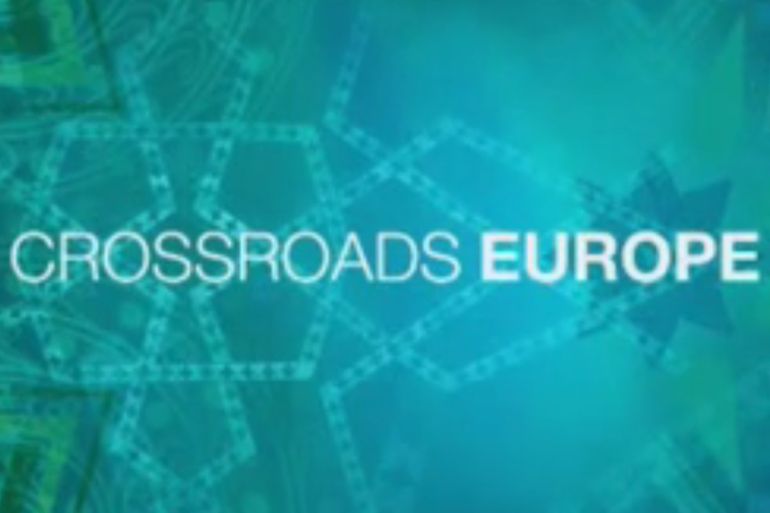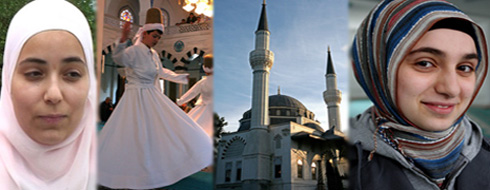
Crossroads Europe
Exploring the challenges Muslims face of multiculturalism in four European countries.
 |
The face of Europe is changing.
You can hear the sound of Arabic, the sight of mosques and culture from across the Islamic world taking root in cities and countries throughout the continent.
Keep reading
list of 4 itemsMuslim pupil loses UK court bid over Michaela school prayer rituals ban
Photos: Sikhs celebrate harvest festival of Baisakhi, marking new year
Masses gather for Eid celebrations in India
The fastest growing religion in Europe, Islam and Muslims are on the rise, as is the immigrant population.
But Europe is finding itself at a crossroads, how does it deal with these new people?
Crossroads Europe, a four-part Al Jazeera series, takes a look at the problems and promises of immigration through the eyes of the people who live there.
| Assimilation No, Integration Yes – the story of Malmo Episode One |
Filmmaker Sharmeen Obaid-Chinoy probes under the rosy image Sweden has historically had of a welcoming immigration policy to bring us the true picture of Muslims living in Malmo.
In the words of one Muslim leader, the Muslim community can integrate into the larger community – but will not lose its cultural and religious identity.
Obaid-Chinoy speaks to Barang, an influential 22-year-old rap artist from Rosengard; Malmo’s poorest and immigrant-populated district.
Barang feels his highly political lyrics are the best way to express his frustration at feeling excluded from Swedish society.
The hostility felt by some can lead to fierce tension with the police. Obaid-Chinoy encounters confrontation between Swedish officers and defiant Palestinian teenagers in Rosengard.
Despite this, and the district’s devastating unemployment rate of 90 per cent in some pockets, the city’s residents remain hopeful for change.
| Spain’s Hidden Mosques Episode Two |
Filmmaker Justin Webster explores Spain’s uneasy relationship with its Muslim population.
Webster lives in Spain and finds battles over the construction of new mosques to be one of the most pressing problems Muslims in Barcelona and Catalonia face.
Dozens have been closed down in recent years after fierce political and public opposition. And, when mosques are built, they can be found in small, make-shift venues – largely hidden from public sight.
But in the southern city of Granada, once the symbol of Islamic power in Europe, Justin finds a different story.
After the construction of a mosque in the shadow of the Alhambra four years ago, young Muslims speak about the refreshingly different perception Spaniards have of Muslims.
Locals say they are happy for mosques to be built – and permission for the opening of new ones is much easier to come by.
| Muslim Berliners Episode Three |
Mariam Shahin is a Berlin-born filmmaker of Palestinian descent.
Her father first came to Germany as a student.
In the film Muslim Berliners she looks at the uneasy history of Turkish and Middle Eastern immigrants, many of whom feel German – but find their allegiances questioned, especially after 9/11.
While some young people experience hostility, and often use their Islamic identity as a way to rebel, others say they do not experience harassment at all – and appreciate efforts to create greater understanding between the two cultures, as a new TV series has done.
Shahin also speaks to some of Germany’s rising number of new Muslim converts.
She discovers that many German converts are now playing an active role in explaining Islam to non-Muslim Germans.
| Black, White, and Red Marseille Episode Four |
Whether you are black, white, or red – Marseille is Marseille, one resident declares.
French filmmaker Francois Bringer reports on a story of successful integration in Marseilles, which is rapidly becoming France’s first majority-Muslim city.
While there have been minor clashes in the past, Marseille has largely seen comfortable collaboration between its faiths and cultures.
Residents account for their tolerance through their shared history, the large number of locals who originate from different countries, and the absence of the word “community” in the official language of the French republic – because of the French desire to make their citizens pledge allegiance first to the republic and not to their religious or ethnic community.
A remarkable story of the conflict that could have been.
This series first aired in 2007.